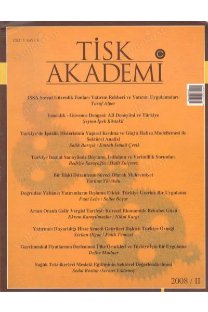Kadın Çalışanların Çalışma Koşullarına İlişkin Hukuksal Düzenlemelerin AB ve Türk İş Hukuku Bakımından Karşılaştırmalı Bir İncelemesi
Türkiye, AB ile 1999'da Birliğe resmi aday ülke statüsü tanınmasından bu yana, uzun soluklu bir ilişki içerisindedir. AB ile Türkiye arasındaki katılım müzakere süreci 2005'de başlamış olmakla birlikte, bu süreç, ilişkideki politik çıkmazlar nedeniyle hala devam etmektedir. Bununla birlikte TBMM, 2000'lerin başından itibaren, Türkiye'nin ulusal hukuk düzenini AB müktesebatıyla uyumlu hale getirmek için pek çok reform paketi çıkarmaktadır. Bu çerçevede, Türk İş Hukuku mevzuatında da pek çok güncel değişiklik yapılmaktadır. Bu çalışmada, Türk kadın çalışanların değişen çalışma koşullarına ilişkin hukuksal düzenlemelerin AB normları ile mukayeseli ve detaylı bir incelemesi yapılacaktır.
A Comparative Analysis of the Legal Norms Concerning Working Conditions of Female Workers in the EU and Turkish Labour Law
Being granted an official candidacy status in 1999, Turkey has been holding a long-standing relationship with the European Union (EU). Accession negotiations for Turkey started in 2005, yet the process has still been in progress due to several deadlocks in the political sphere of the relations. However, Turkish Parliament has long been passing many reform packages in order to bring Turkey's national legal system in line with the EU Acquis (acquis communautaire) since the early 2000's. Many recent changes have been brought to Turkish Labour Law in that regard. This study aims to provide a comparative and detailed analysis of the legal norms concerning the changing working conditions of Turkish female workers with the EU norms.
___
- Susanne, B. and S. Prechal. (February 2009). The Transposition of Recast Directive 2006/54/EC, European Network of Legal Experts in the Field of Gender Equality, European Commission-Directorate General for Employment, Social Affairs and Equal Opportunities Unit, EMPL/G/2.
- Di Torella, E.C. (January 2014). Brave New Fathers for a Brave New World? Fathers as Caregivers in an Evolving European Union, European Law Journal, Vol.20, No.1, 88-106.
- Evelyn, E. (2005). EU Anti-Discrimination Law, Oxford University Press, New York.
- European Commission Press Release, (01.07.2015). Delivering for Parents: Commission Withdraws Stalled Maternity Leave Proposal and Paves the Way for a Fresh Approach, Brussels, available at : http:// europa.eu/rapid/press-release_IP-15-5287_ en.htm[20.07.2015]
- Eurostat Employment Statistics, available at:http://ec.europa.eu/eurostat/statisticsexplained/index.php/Employment_statistics[12.07.15]
- Eurostat Unemployment Statistics, available at: http://ec.europa.eu/eurostat/statistics-explained/index.php/Unemployment_statistics[12.07.15]
- Foubert, P. (2002). The Legal Protection of the Pregnant Worker in the European Community-Sex Equality, Thoughts of Social and Economic Policy and Comparative Leaps to the United States of America, Kluwer Law International, The Hague.
- Kaya, G. (2012). Avrupa Birliği İş Hukuku'nda Cinsiyet Ayrımcılığı, Avrupa Birliği Bakanlığı Akademik Araştırmalar Serisi-1, Ankara.
- Kenner, J. (2003). EU Employment Law, From Rome to Amsterdam and Beyond, Hart Publishing, North America.
- Kökkılınç, A.G. (Ekim 2012). İş Hukukunun Uluslararası Kaynakları Işığında Kadın İşçilerin Korunması, Legal, İstanbul.
- Kökkılınç, A.E. (2006). Avrupa Birliği Hukukunda Ebeveyn İzni, Legal İş Hukuku ve Sosyal Güvenlik Hukuku Dergisi, Sayı:9, 111- 132.
- Masselot, A. (March 2007). The State of Gender Equality Law in the European Union, European Law Journal, Vol.13, No.2, 152-168.
- Mc Glynn, C. (2006). Families and the European Union Law, Politics and Pluralism, Cambridge University Press, N.Y.
- Milevska, T. (07.07.2014). Draft EU Law on Maternity Leave to be Scrapped as Red Tape, Euractiv, available at: http://www.euractiv.com/sections/social-europe-jobs/drafteu-law-maternity-leave-be-scrapped-red-tape-303316
- Pascall G. and J. Lewis, (2004). Emerging Gender Regimes and Policies for Gender Equality in a Wider Europe, Journal of Social Policy, Vol.33, 373-394.
- Schiek, D. (June 2002). A New Framework on Equal Treatment of Persons in EC Law?, European Law Journal, Vol.8, No.2, 290-314
- Süral, N. (Mart 2015). Türkiye'de Kadın İstihdamı: Hukuki Düzenlemeler ve Sosyal Politikalar, TİSK Akademi, Cilt: 10 Sayı 19, Ankara, 6-43.
- Tánczos, J. (July 2015). Fresh Approach for a Maternity Leave Proposal, Policy Viewpoint, available at: http://www.feps-europe.eu/assets/ cd6ce346-1fac-43ee-bc99-a3d9a45ec4c3/pvmaternity-leavepdf.pdf[18.07.2015]
- Toplumsal Cinsiyet İstatistikleri, Gender Statistics, (Ankara, 2014). Turkish Statistical Institute, Publication Number, 4370; available at: h t t p : / / w w w. t u i k . g ov. t r / K i t a p. do?metod=KitapDetay&KT_ ID=11&KITAP_ID=294[10.07.2015]
- The Revised Parental Leave Framework Agreement, An ETUC Interpretation Guide, European Trade Union Confederation (ETUC), available at: https://www.etuc.org/sites/www. etuc.org/files/The_Revised_Parental_Leave_ Framework_Agreement_EN.pdf [16.07.2015]
- Noyan, T.- M. Sur. (2010). Turkish Labor Law, İzmir.
- Yenisey, K.D. (2002). Kadın-Erkek Eşitliği Bakımından Türk İş Hukuku'nun AB Hukuku ile Olası Uyum Sorunları, Yargıç Dr. Aydın Özkul'a Armağan, Kamu-İş, C.6, 31-72, available at : http://www.kamu-is.org.tr/pdf/643. pdf[10.07.2015]
- ISSN: 1306-6757
- Yayın Aralığı: Yılda 2 Sayı
- Başlangıç: 2006
- Yayıncı: Türkiye Isveren Sendikalari Konfederasyonu
Sayıdaki Diğer Makaleler
Türki Cumhuriyetlerde Finansal Regülasyon Uygulamalarının Değerlendirilmesi
RAMAZAN GÖKBUNAR, MUSTAFA YILDIRAN, ÖZGÜR EMRE KOÇ
Piyasa Riskinin Ölçülmesi: Enerji Piyasası Üzerine Bir Uygulama
SAMET EVCİ, SERKAN YILMAZ KANDIR
ABDULKERİM DAŞTAN, UĞUR BELLİKLİ
Türk ve Alman İş Hukukunda İşçinin Cinsel Tacize Karşı Korunması
Kurum İçi Girişimcilik Nasıl Geliştirilebilir? Bir Model Önerisi
Cenk Laçin ARIKAN, Didem ENGİNOĞLU
Geçiş Ekonomilerinde Finansal Gelişmenin Kurumsal Belirleyicileri
PINAR HAYALOĞLU, SEYFETTİN ARTAN
Hırsızlık Suçunun Sosyo-Ekonomik ve Demografik Belirleyicileri: Panel Veri Analizi
